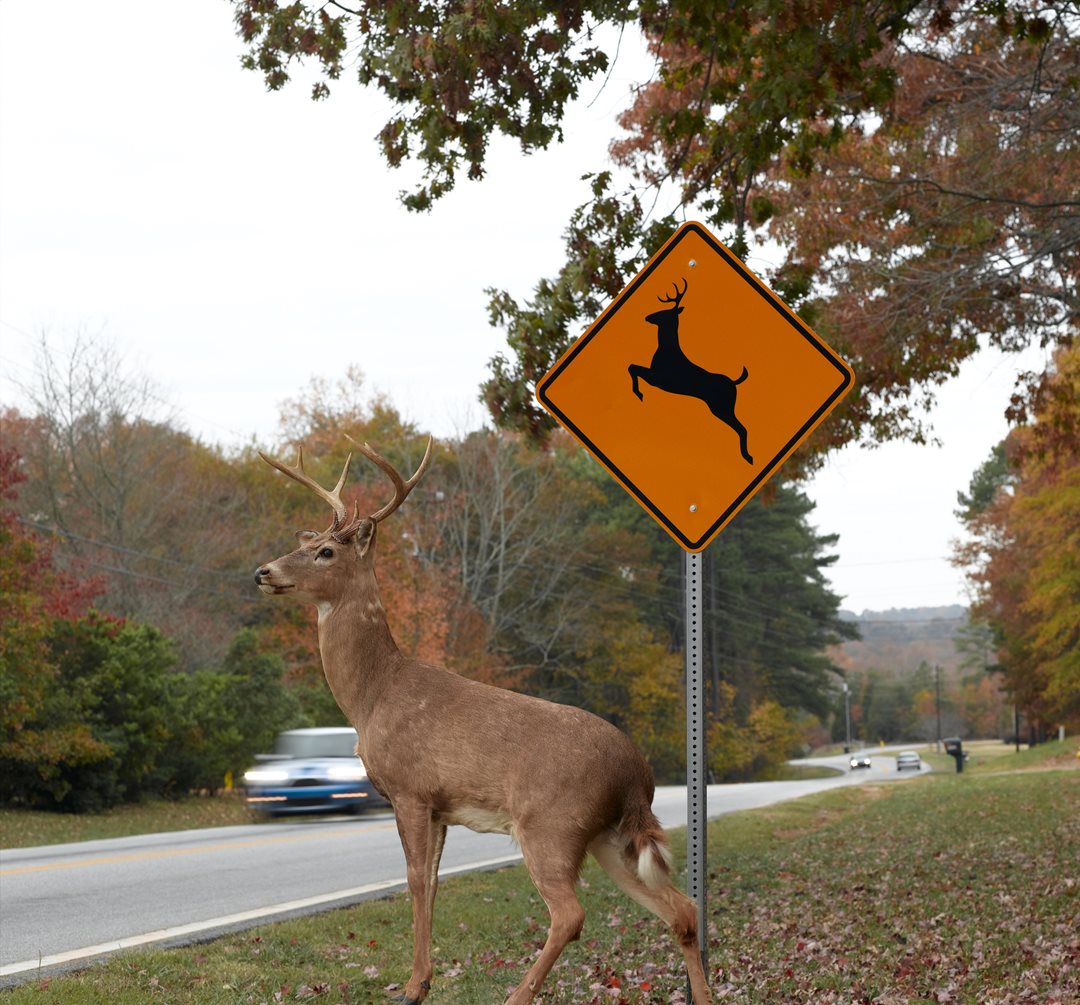Everything you need to know about hitting a deer | PEMCO
 Fall brings an array of changes, from the reintroduction of the pumpkin spice latte, to our favorite local teams hitting the stadiums. But some seasonal changes do not come as welcome as others...
Fall brings an array of changes, from the reintroduction of the pumpkin spice latte, to our favorite local teams hitting the stadiums. But some seasonal changes do not come as welcome as others...
According to University of Washington researchers, drivers are more 16% more likely to hit a deer after the fall time change (which is on Nov 2 this year). Our “falling back” puts more cars on the road during darker evening hours, a prime time for deer.
That’s only part of the story, though. Deer are naturally on the move in October and November. It’s the top time of year for car-deer collisions as the transition to colder weather drives the animals to lower elevations in search of better grazing. That’s also when they’re migrating to find mates. About one-half to two-thirds of deer collisions happen between October and December.
Fortunately, there’s a lot you can do to reduce the chances of hitting a deer. And if it does happen? Your PEMCO Auto policy may be able to help. (More about that below.)
How can I reduce my chances of hitting a deer?
You can breathe easier when driving through deer country when you follow seven deer-smart tips:
1. Beware at dawn and dusk. That’s when deer are the most active. Accidents are also more common on newer stretches of roadway. Tender, freshly planted grass and shrubs attract hungry deer.
2. Cut your speed. Those extra seconds buy you precious time to react to a deer in your path.
3. Use high-beam headlights on rural roads. They can illuminate the eyes of a deer near the roadway.
4. Expect more deer if you see one. Deer often travel in groups of two or three. They may dart out to join another that has just crossed the road.
5. Don’t swerve. Unfortunately, you’re much more likely to wreck your car if you swerve to avoid a deer, rather than hit it. Slow down as quickly as possible, stay in your lane, and maintain control.
6. Honk steadily. If a deer seems “frozen” in your headlights, your steady honk may be enough to scare it safely back to the woods.
7. Buckle up (or, for motorcyclists, wear a helmet). Your chances of serious injury soar if you’re not properly protected in all types of accidents.
What should I do if I hit a deer?
-
Pull off the road if your car is drivable and turn on your hazard lights so you’re visible to oncoming drivers.
-
Call 9-1-1 if anyone is injured, your car is damaged, or the animal is lying on the road. The police can remove it so it’s not a hazard to other drivers. Never attempt to move or render aid to a wounded wild animal since, in its panic, it could seriously injure you.
-
Photograph the damage, scene, and road conditions. If another driver stops to help you, ask for their contact information in case they need to give an account of the accident.
-
Check that your car is safe to drive before leaving the scene. Look for things like leaking fluid and tire damage. If in doubt, call for a tow.
-
Report the accident to PEMCO. You can contact PEMCO online or call 1-800-GO-PEMCO anytime, day or night.
-
Report the accident to the authorities. Complete a Vehicle Collision Report in Washington or Traffic Accident and Insurance Report in Oregon if anyone was injured or damages appear to exceed $1,000 in Washington or $2,500 in Oregon. You have four days in Washington and three days in Oregon to file your report.
Does my insurance cover hitting a deer?
It depends. What's covered will depend on the damage and the coverages you chose:
-
Damage to your car: If you hit a deer or swerve to avoid it and damage your car, your insurance may pay to fix it, provided you purchased what’s called Comprehensive coverage for your vehicle. If the damage is so bad that your car is totaled, we’ll reach an actual cash value settlement with you for your vehicle, less the deductible you selected for that particular vehicle. The deductible is the amount of coinsurance or out-of-pocket expense you pay on a covered loss.
-
Damage to another car or injuries to its passengers: Your policy’s liability coverage (required for all drivers in Washington and Oregon) can help if you hit another vehicle or damage someone’s property when trying to miss a deer. Your liability coverage may compensate the other parties for any related property damage or bodily injuries they have, subject to your coverage limits, but only to the extent that you have some responsibility.
-
Injuries to you or your passengers: If you’re hurt in the accident, your policy could cover your medical bills under personal injury protection (PIP), which is an optional purchase for consumers in Washington and required in Oregon. If your medical bills exceed your policy’s limits, your personal health insurance may help make up the difference.
Don’t forget that, even if no other cars are involved, you’ll need to follow your state’s laws for reporting motor vehicle collisions.
No one wants to think about hitting anything – much less a beautiful wild animal. But as upsetting as a deer collision may be, know that you don’t have to deal with it alone. We’re here to help.
Drive safe, PNW.
*If you’re buying your vehicle with a loan, lenders typically require you to carry comprehensive and collision insurance on the car until it’s paid off.
Share on social media